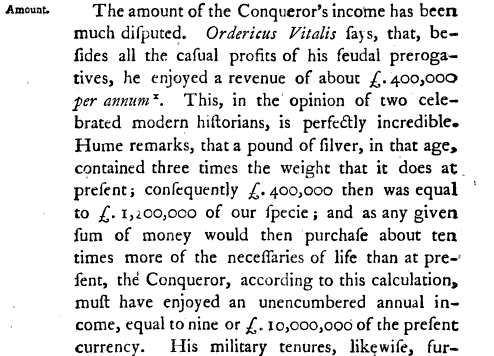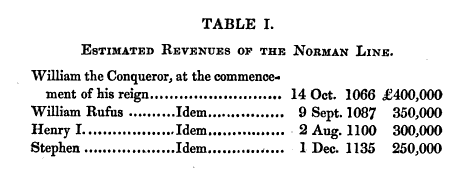A quick look at the [list of wealthy individuals][1]list of wealthy individuals from historythe middle ages, gives us William the ConquerorWilliam the Conqueror for someone most of us are familiar with. The wiki list is a bit vague on dollar amounts, so a little more research leads us to another article [here][2]here which has this to say:
William the Conqueror was a King of England, and had an inflation-adjusted estimated net worthnet worth of $229.5 billion.
(google says that's £172.125 billion) Since comparing net worth is not a simple issue, the OP is asking for income figures. Digging a little deeper I was finally able to come up for some numbers on William, which show why he was considered one of the richest men in history.
From the Book Taxation, Revenue, Expenditure, Power, Statistics, and Debt of the Whole British Empire; Their Origin, Progress, and Present State: , published in 1833,there is a table which shows the revenue of William the Conqueror:
So £400,000. But this is just one source, so continuing to search, another book showed up discussing this:The History of the Public Revenue of the British Empire : Containing an Account of the Public Income and Expenditure from the Remotest Periods Recorded in History, to Michaelmas 1802; with a Review of the Financial Administration of the Right Honorable William Pitt. By Sir John Sinclair published 1803. On page 70 they get around to discussing the revenue collected by William:

Another match of the £400,000 figure, with a source. Later in the book(pg 72) they discussed the reasons for trusting the figures presented by this source:
...it is impossible totally to discredit the accounts of Vitalis an historian who was born only nine years after the conquest and consequently must have enjoyed better access to information than any modern can pretend to
...Besides Vitalis is so particular in the sum he mentions stating not only the pounds but even the number of farthings which William received namely £1,060 30 s 1/2d a day ...that one would suppose his information was derived from authentic records and was not founded on vague or hasty computations.
The historian whose figures are mentioned is Orderic Vitalis, and the wiki page mentions, concerning him:
Modern historians view him as a reliable source.
So we have an estimate of roughly £400,000 for an income for William the Conqueror.
Concerning the laborers wage:
Update: I later noticed the 'inflation adjusted' part on the kings worth, so feeding the £2 per year salary Getting rid of the laborer into the calculator mentioned on the site providing the laborers wage, gives a figuremy old attempt at comparing apples and oranges, adjustedor trying to 2005translate values, of £1 to todays' dollars or pounds,065.44. A little more accurate comparison.
So there's a quick estimate of your we have two numbers £400, £172000 to £2.125 billion vs £1 Therefor,065.44. The years for if we take the 19th century figures aren't exactat face value, but I think the difference between King and peasant are fairly well represented.we can conclude that:
The OP in comments brought up the difficulty in comparing net worth with income, so we can try to look at- William the Conqueror made 200,000 times the wage of a day laborer.
Not quite the net worthequivalent of the day laborer to balance the comparison. The medievalGates 33 million per day laborer is a serf, so his assets would be essentially 0. If we make a wild assumption that he can save 10% of his wages, you might optimistically give him a net worth of £100but not inconsequential.
If my math works out It was definitely, thatas Mel Brooks would give a figure of 1.72 billionsay,"Good to 1be King". [1]: https://en.wikipedia.org/wiki/List_of_wealthiest_historical_figures#Middle_Ages [2]: https://www.therichest.com/celebnetworth/politician/royal/william-the-conqueror-net-worth/
